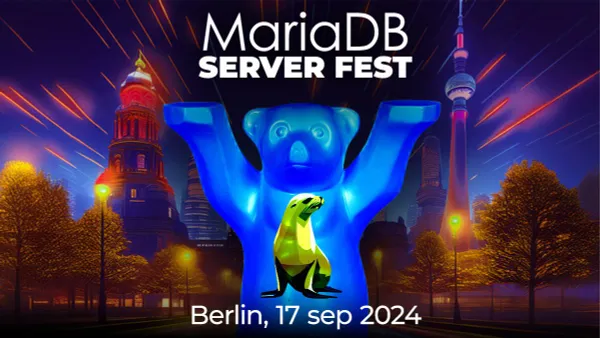Category Archives: Community
Another quarter year has gone by, and in the world of MariaDB, it is time for another contributions report. The raw data for this report can be found on GitHub, here.
Server contributions
Just like last quarter, I’m going to start with a breakdown of all the organisations who have contributed to MariaDB Server so far this year.
| MariaDB Plc | 29 | 1262 |
| MariaDB Foundation | 6 | 123 |
| Codership | 7 | 77 |
| Independent | 17 | 57 |
| Amazon | 12 | 50 |
| Arch Linux | 1 | 6 |
| GSoC | 3 | 5 |
| IONOS | 1 | 4 |
| Alibaba | 1 | 3 |
| Rakuten | 1 | 3 |
| HardenedBSD | 1 | 2 |
| OpenBSD | 1 | 2 |
| University of Sydney | 1 | 2 |
| Arm | 1 | 1 |
| Chainguard | 1 | 1 |
| ClearCode | 1 | 1 |
| FreeBSD | 1 | 1 |
| IBM | 1 | 1 |
MariaDB Server contributions for from 1st January 2024 – 8th October 2024
There have been some interesting things to note here.
…
Continue reading “MariaDB Contribution Statistics, October 2024”
I recently helped two of our sponsors simultaneously, DBS Bank and MariaDB Plc, with a recent issue they were experiencing. This actually helped us add support for an extra cloud vendor. But before I tell the story, I first need to give a bit of background.
S3 Engine History
Back in 2019, we added the S3 engine to MariaDB Server. “S3” stands for “Simple Storage Service”, it was developed by Amazon, and it is pretty much the standard for storing objects (typically files) in the cloud. Almost every cloud vendor has their own object storage with an S3-compatible REST API.
…
Continue reading “MariaDB Foundation assisting multiple vendors”
There are a number of SQL Fiddles, web interfaces to databases for testing / learning SQL. Recently we noticed the versions on these falling behind and not presenting users with updates that would deliver the latest MariaDB features and bug fixes.
In reaching out to the people that manage these fiddles we’re pleased to announce that so far, two providers have updated their MariaDB version(s).
PHPize.online / SQLize.online
PHPize.online and SQLize.online are the pet projects of Slava Rozhnev. These have both been updated and now have available MariaDB 11.4, our current long term support version, and also MariaDB 11.5.
…
Come join us in Berlin, on Tue 17 Sep 2024! It’s time for our next MariaDB Server Fest, which we invite you to enjoy in person or virtually.
MariaDB Server Fests are the events where MariaDB Foundation and friends celebrate and share the latest new happenings in the world of MariaDB Server. And Berlin is a great place to be – to work in, to travel to, to meet in.
Welcome to Berlin!
The physical event is hosted by MariaDB Foundation’s valued sponsor IONOS, on Revaler Straße 30 in the vibrant and trendy Friedrichshain area of Berlin.
…
MariaDB Vector preview was recently released, bringing much awaited Vector Search functionality to MariaDB Server. One of the major open source contributors to MariaDB Vector has been Amazon. To share the excitement and get an inside view about what it’s like to contribute to MariaDB Server, I had a chat with software engineer Hugo Wen on the Amazon RDS team.
Hugo’s contributions to MariaDB Vector
Hugo Wen’s work on vector similarity search in MariaDB and MySQL started when Amazon’s leadership identified Vector Search functionality as a critical addition and decided to invest Amazon RDS team’s time on contributing to MariaDB Vector.
…
On the 3rd of July, two weeks ago, I created a poll to ask about the future of feature development branches in MariaDB Server. Specifically, whether we should switch to a rolling model which is more familiar to users of services such as GitHub.
The votes we received gave a very clear result. Today I will share the conclusions we drew, as well as setting expectations for what will happen next.
Recap: what is this “main” branch all about?
In a rolling model, there is one main branch of the tree that all the feature commits go into (typically called “main”), and this is then forked when it is time to prepare a major release.
…
Continue reading “MariaDB Server GitHub branches: Moving to “main””
We are half way through the year! Where has the time gone?! This means that is time to talk contributions statistics. The raw data used for this blog post can be found on the metrics GitHub repo.
Server contributions so far
The following table contains the basic contribution stats for MariaDB Server in 2024 so far. We have contributions from almost twice as many non-MariaDB organisations as last quarter, which is fantastic to see. The more varied our contribution sources, the better.
| MariaDB Plc | 29 | 923 |
| MariaDB Foundation | 6 | 64 |
| Codership | 6 | 48 |
| Independent | 13 | 41 |
| Amazon | 11 | 28 |
| Arch Linux | 1 | 6 |
| GSoC | 2 | 4 |
| Alibaba | 1 | 2 |
| OpenBSD | 1 | 2 |
| University of Sydney | 1 | 2 |
| ARM | 1 | 1 |
| FreeBSD | 1 | 1 |
| IBM | 1 | 1 |
| Chainguard | 1 | 1 |
MariaDB Server contributions for from 1st January 2024 – 2nd July 2024
Just like last time, we can almost do a like-for-like 2023 Q2 and 2024 Q2 comparison.
…
Continue reading “MariaDB Contribution Statistics, July 2024”
Many countries in the world right now are hosting elections, in fact, my own country’s election is tomorrow. MariaDB Foundation is also asking for you to make one more vote on our own kind of referendum.
We have recently had a request by a member of the community to change how we use GitHub, in a way that, in-theory, will make things easier for community contributors. I’ll explain the current situation, the proposal and then the poll.
Current situation
At the moment, if you want to develop a new feature for MariaDB Server, it needs to be developed against the latest version branch, which is the default branch when you view on GitHub.
…
Continue reading “MariaDB Server GitHub branches: Have your say”






